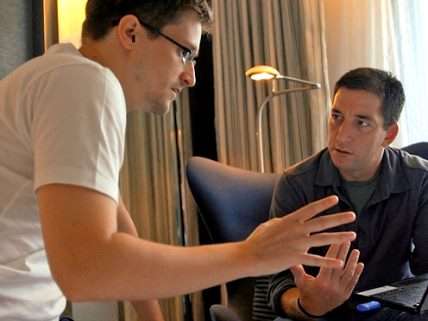Citizenfour
Bombshell documentary brings Edward Snowden into sharper focus.

In January 2013, Laura Poitras, an American documentary filmmaker, was drawn into a heavily encrypted email correspondence with a person using the name "citizenfour." Poitras' area of journalistic enterprise was U.S. government behavior in the wake of 9/11. Her 2006 film, My Country, My Country, had won her both an Oscar nomination and, she said, a place on a Department of Homeland Security watch list. "Citizenfour" was appreciatively aware of this, and he had a new story he wanted her to tell. He claimed that America's National Security Agency, already suspected to be out of control, was engaged in a secret program of domestic surveillance that was actually vast beyond the dreams of paranoia. "Which I can prove," he said. He had already been in contact with Glenn Greenwald, an American investigative journalist with a British newspaper, The Guardian. Now he wanted to rendezvous with Poitras and Greenwald, face to face. Would they fly to Hong Kong? They would, and did. And there, in an anonymous hotel room, they met Edward Snowden, rogue NSA analyst, and became privy to his hoard of downloaded secrets.
This eight-day debriefing now forms the bulk of Poitras' bombshell documentary, Citizenfour. The director began filming their hotel-room encounter right away, and part of the film's power is the fresh sense it conveys of a veil being drawn back from our eyes to reveal a shocking new world. Snowden's revelations, which began appearing in the Guardian and the Washington Post in June of 2013, are now dismally familiar. But here, along with Poitras and Greenwald, we're hearing them related for the first time, and they still astonish.
Snowden documents a world in which the NSA routinely collects cellphone conversations from millions of Americans, along with their email and records of their other online activities, and consigns all of it to a huge NSA data-storage lair in Bluffdale, Utah. Woven together, this information tells highly detailed stories about blameless private citizens, to be used later, perhaps, for purposes not yet devised. "It's not science-fiction," Snowden says. "This stuff is happening right now." And the only arbiters of such behavior – the only bulwark against abuse -- are secret intelligence courts and fully-briefed but unobjecting politicians. "I remember what the Internet was like before it was being watched," Snowden says. "Now people make jokes about being watched. They accept it." (Poitras brings in Jacob Appelbaum of the Tor Project to expand upon this thought: "What people used to call liberty," Appelbaum says, "we now call privacy.")
Snowden also has many alarming things to reveal about Britain's Government Communications Headquarters (GCHQ), which is heavily involved in spying not just on its own citizens, but on those of other countries as well. Although it was the NSA that was forced to take credit for tapping the cellphone of German Chancellor Angela Merkel, GCHQ has been revealed by Snowden to be a world-class privacy threat.
The film unfolds with cool deliberation. Snowden, mild-mannered and personable, sits quietly on the edge of a hotel-room bed, explaining himself and his red-hot data to Greenwald, who's frequently flabbergasted. Twenty-nine years old at the time of filming, Snowden had worked for several years as an NSA contractor in the field of cyber security and analysis, first in Japan, most recently in Hawaii. He says he had become alarmed at the extent of the agency's spying on U.S. citizens, but had held out hope that the Obama Administration would deliver on its promises of governmental renewal. When that didn't happen – when Obama turned out in some ways to be Bush II -- Snowden said he began downloading top-secret NSA documents, tens of thousands of them. Then, in May of 2013, without informing his longtime girlfriend, Lindsay Mills, or his parents, he suddenly flew from Hawaii to Hong Kong with all of his carefully encrypted NSA files in hand.
Snowden is known mostly as a soft-spoken presence on CNN or a digital manifestation at the South by Southwest Interactive Festival in Austin earlier this year. Here, though, he comes into clearer focus. He doesn't seem especially political (although his interviews have of course been edited), and he doesn't come off as devious. ("I don't want to hide," he says, at one point he telling Poitras to "paint the target on my back.") He is prone to occasional flourishes of cyber-spy tradecraft, automatically unplugging landline phones (they can be used for eavesdropping), draping a small blanket over his head when typing passwords into his laptop (wary of hidden ceiling cameras); and conducting one discussion with Greenwald by writing sensitive points down on slips of paper rather than speaking them aloud. For the most part, though, Snowden is about as sinister as someone you might encounter behind an Apple Genius Bar.
Poitras uses a subtle electronic score to give the film a rich, brooding atmosphere; and she employs news footage to sharp effect. Watching National Intelligence Director James Clapper testifying before Congress and lying through his teeth about NSA data trolling, we immediately wonder why Snowden is facing 30 years in jail if he's ever apprehended, while Clapper has been charged with nothing.
The film also comes close to resolving the major question about Snowden. Is he just a traitor, baring his country's secrets with an ideological goal or maybe just money in mind? Or is he the most consequential whistleblower of our age? He tells Greenwald at the outset that some of the documents he's downloaded are legitimately classified, and should remain so; and while he has since found refuge in Russia (and been joined there by Lindsay Mills), he claims he brought none of the NSA material with him. As one commenter at the Guardian Website observed, "He may have betrayed his government, but he didn't betray his fellow citizens…."


Show Comments (12)